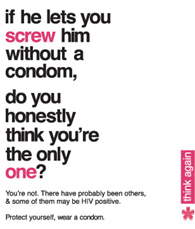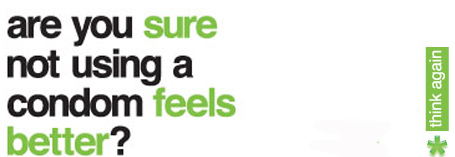Developed by Fridae for Action for AIDS, the *think again campaign was designed based on the findings of the 2006 MSM Survey (known as evidence-based design) which was conducted in April this year. The campaign, which will be launched on Nov 11, aims to address the gaps in the traditional HIV prevention messages which have led to high rates of inconsistent condom use amongst MSM.

From Nov 11, the campaign will be launched on gay web sites and in clubs, bars, and various establishments that cater to gay men. The campaign comprises a web site with downloadable wallpapers, posters, drink coasters and other paraphernalia which feature 11 provocative slogans such as "if he lets you screw him without a condom, do you honestly think you're the only one?". The messages are aimed at provoking the reader to consider the various scenarios which would affect his behaviour, and to encourage safe sex practices.
Developers of the campaign recognise that successful HIV prevention is dependent on changing risk behaviours and the urgent need to go beyond simple knowledge of HIV and how it is transmitted.
The campaign's conceptualisation was a result of the third online behavioural sex survey of MSM in Singapore, conducted by Action for AIDS Singapore in collaboration with Fridae in April 2006. The survey received 3276 respondents, of which 1479 (45.1%) were Singapore residents.
The survey aimed to gain an in-depth understanding of the attitudes and behaviour of MSM, with the objective of using the results to design HIV prevention campaigns to be more effective in addressing MSM issues.
Based on a set of questions called the Behavioural Surveillance Survey (BSS) format developed by Family Health International (FHI) and IMPACT (Implementing AIDS Prevention and Care Project), statistical analysis was provided by Professor George Bishop, Head of the Psychology Department at the National University of Singapore.
Basic Demographic Data of Singapore Residents from the 2006 MSM Survey
Ethnicity
Chinese 80.0%
Malay 7.3%
Indian 3.3%
Eurasian 2.0%
Caucasian 3.9%
Others 3.5%
Nationality
Singaporean 83.9%
Malaysian 7.5%
Others 8.6%
Education
Post graduate degree 12.4%
University degree 35.1%
Polytechnic 26.3%
Junior College, Pre University, ITE, Secondary school or less 26.2%
Age
< 20 6.8%
20-24 21.1%
25-29 26.2%
30-34 21.4%
35-39 14.1%
40-44 5.3%
> 45 5.2%
Orientation
Gay 77.9%
Bisexual 14.1%
Heterosexual 2.4%
Undecided 4.9%
Attitude towards one's own orientation
Proud 25.2%
OK 58.5%
Wish I was different 11.6%
Ashamed 1.2%
"Do you want to change?"
No 90.3%
Yes 5.6%
Who are you out to
To family 32.2%
To co-workers 39.4%
To gay friends 90.2%
To straight friends 56.6%
To church 6.0%
Not out to anyone 7.0%
Summary of findings: Singapore residents sub-set
Of the 1479 Singapore residents analysed, 81.3% had sexual contact in the past three months. The remaining 17.4% were excluded from further analysis.
Of those who had sex in the past three months, 30.1% had one partner, 49.6% had two to five partners, and 19.7% had six or more partners. Sexual encounters occurred mostly at home (65.7%), followed by hotels (28.6%), saunas (25.6%), cars (8.0%), public toilets (9.3%) and cruising venues (5.3%).
Most respondents are found to have known their sex partners, i.e. regular partners, or boyfriends (42.8%), or find them through the internet (43.5%). The rest go to the sauna (24.4%), clubs (11.1%), or meet them through friends and social settings (10.8%). Only a minority meet their sex partners through work (3.7%), public cruising places (7.8%), gym (5.9%), or swimming pools (4.6%).
Overall, it was found that there is a high level of inconsistent condom usage amongst the respondents. 51.1% report not using condoms regularly with regular partners or boyfriends, and 32.8% don't use condoms regularly with casual partners.
Reasons varied for not using condoms all of the time during anal sex with same sex partners, but the most common reasons were
- Regular partner or boyfriend
- It feels better without a condom
- Impulse
- My partner looked healthy
In fact, "knowing" one's partner prior to the encounter was the highest risk factor for not using condoms regularly, with 51.1% of these reporting inconsistent or no condom use, followed by 39.6% of those who picked up partners from clubs (with "too drunk or wasted" as a common excuse), 36.4% of those who met through the internet, and lastly 33.6% of those who met at saunas.
Inconsistent condom usage remains the highest risk factor for HIV, with a seven fold increase in the likelihood of someone being HIV positive if they did not regularly use condoms. Not using condoms regularly also correlated with higher rates of sexually transmitted infections.
It was found that the 97.8% had knowledge of HIV and how it is transmitted, and 80.1% have ever had an HIV test (57.2% within the last 12 months, 22.5% in the last one to two years, 11.9% in the last two to four years, and 7.3% more than four years ago).
Self-reporting incidence of being HIV positive was 35 out of 1479 respondents.
Conclusion
To date, the rates of known HIV in Singapore are low relative to other countries. In 2005, there were a total of 317 cases of HIV/AIDS found, of whom 87 were MSM. At such low absolute numbers, small changes cause large statistical movements, and hence traditional statistical analyses don't apply.
It may be true that some of Singapore's HIV campaigns may be effective in keeping Singapore's HIV rates low, but as most public health officials know, incidence data cannot be used in place of prevalence data. Without true sentinel surveillance or prevalence data, we do not know what the true HIV rates in Singapore are.
We suspect that there is an unknown epidemic occurring in Singapore, with many people choosing not to get tested voluntarily, and others opting to get tested and receive treatment outside Singapore. Given the lack of access to affordable HIV medical care in Singapore, and the strong stigma and discrimination that PHA (People living with HIV and AIDS) face here, there is little incentive for voluntary testing.
This applies especially to MSM who also find themselves legal outlaws in the face of Statutes 377 and 377A which make "unnatural sex" illegal. The public health impact of this law is even more insidious when the Ministry of Home Affairs and Ministry of Health invoke it to justify any inaction on their part, often driving gay activities underground as they are "contrary to public interest."
It is not publicly known what Singapore's total HIV prevention budget is, much less how much (if any) it has earmarked to target MSM, who are globally recognised as an "at risk" group necessitating special initiatives to stem the epidemic. This lack of direct action is not only gross negligence of the government, it is also sadly lagging behind even Malaysia (where HIV medical care is subsidised), or Hong Kong (where MSM are one of the Department of Health's top priorities).
It would be a bold and pioneering step for Singapore to enact a law protecting people with HIV/AIDS, provide free or subsidised treatment, free medical assistance, protection of one's job, protection from discrimination, and one's right to stay in Singapore if HIV positive, before considering anything else. PHAs need legal protection from discrimination and access to affordable health care and support more than anything else.
Based on the findings of the study, there is a high level of unsafe sex occurring amongst MSM, and there are many gaps in the messages that are being disseminated to the community. Knowledge of HIV and testing rates are very high amongst the MSM surveyed, yet this has not led to safe sex behavior.
It is imperative to plug these gaps in understanding, and address the myths and misconceptions that MSM in Singapore may have regarding HIV and safe sex behavior. One of the highest risk behaviors is unsafe sex between individuals who already know one another, and hence have an implicit trust between each other. Other risk taking behaviors include forgoing condoms because anal sex "feels better" without one, or taking risks while drunk or high.
With the *think again campaign, we have designed a series of messages that address the gaps we found from the 2006 MSM Survey. It challenges people to reconsider some of their ideas about HIV, AIDS, and their own personal behavior. Instead of merely reminding people of the existence of HIV, it targets specific behavior and encourages MSM to practice safe sex.
After all, staying healthy means getting to enjoy life (and sex) for much longer.
The comprehensive campaign will be launched on Nov 11 at Happy (21 Tanjong Pagar Rd), and across Singapore at gay clubs, bars, saunas and other establishments, online on popular gay portals and chatrooms, as well as retail outlets frequented by the gay community. The full *think again campaign can be found at www.afa.org.sg/thinkagain.
Stuart Koe has a Doctor of Pharmacy, specialising in HIV medicine. He is the CEO of Fridae, Director of AIDS Concern in Hong Kong and Trustee of the Action for AIDS Endowment Fund in Singapore. He has been a long time AIDS activist, and has collaborated with various AIDS NGOs and INGOs across Asia, Australia and the USA in the fight against AIDS.

